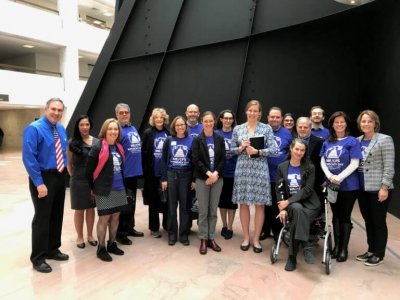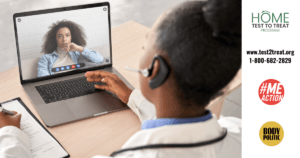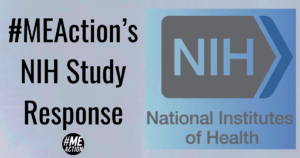We are so proud and grateful for the work of Solve M.E., #MEAction’s activists, state groups, volunteers and supporters who have rallied behind H.R. 7057.
Over the past few months, #MEAction has met with Solve M.E. to discuss our respective efforts and how we can best coordinate and support each other’s work. While #MEAction’s 2020 US advocacy has focused on challenging federal agencies to take urgent action to address the ME crisis, Solve M.E. has focused on engaging Congress to increase funding for ME/CFS research. The H.R. 7057 bill has been a result of years of hard work by our community: the advocates who have helped raise awareness of ME/CFS on the Hill and develop key relationships, as well as all of you across the country who have reached out to your representatives, often from home or bed. We wanted to share with the #MEAction community more information about HR 7057, highlight the great work of Solve M.E., and tell you how you can take action today.
HR 7057 Legislation
What the bill does:
The bill gives congressional approval to the National Institutes of Health (NIH) to spend $15 million per year with respect to post-viral chronic neuroimmune diseases, specifically myalgic encephalomyelitis/chronic fatigue syndrome (ME/CFS), from 2020 through 2024 specifically for:
- Robust data collection and data sharing
- More and bigger Collaborative Research Centers
- Develop a research agenda with stakeholders, and
- New disease specific funding announcements
While $15 million is still a small amount as compared to what we need and deserve, it could be an important stepping stone to getting more funding in the future. The NIH spends roughly $12 million on ME/CFS research currently, and this bill increases that spending by $3 million a year for the next four years and codifies it so that funding cannot be taken away. And while we know that we need significantly more money than the additional $3 million (Emily Taylor, Director of Advocacy at Solve M.E. quotes Water Koroshetz saying that ME research needs “10 or 20 times the funding” to see immediate results, in her Q&A on the bill, which we encourage you all to read), Congress work is a long game, not a short game, so this bill is a part of a bigger picture and strategy to fight for equitable disease research funding in the long term. By the bill being introduced, it can give us more momentum to continue to fight for more funding moving forward, particularly in the light of Covid-19 long-haulers symptoms and their relationship to ME.
A few more notable aspects of H.R. 7057 include: The bill requires a report to Congress within 2 years to demonstrate the NIH’s progress, which ensures oversight. Lastly, the bill includes language that would allow for better ME/CFS medical education in the future.
The bill currently has 32 bipartisan co-sponsors. You can view the full list here.
The full language for the bill can be found here.
How the bill came to be:
The bill’s introduction is building upon the years of Congressional advocacy work from so many of you that participated in Advocacy Days and congressional actions this year and in the years past. Your attendance, actions, and relationship building with your elected officials on the state and federal level made a huge difference.
#MEAction state groups have been putting in hours doing the calls to action and posting on social media.
#MEAction Maryland is the newest #MEAction state chapter. Melinda Lipscomb of #MEAction Maryland says, “ As a new state chapter, our co-chairs have utilized our social media channels, sent emails and made calls to the Representatives in Maryland asking them to co-sponsor HR 7057. In monthly meetings, we’re asking members to report updates on responses and giving tools like sample tweets and emails highlighting updates to coordinate our efforts.”
#MEAction Georgia is also working hard on supporting the bill. Liz Burlingame of “#MEAction Georgia says, “Members are focused on building relationships with our congressional representatives. Sadly, our most dedicated congressional ally passed away this summer. The Honorable John Lewis (GA-5th) will be sorely missed…#MEAction Georgia advocates have spoken by phone with 8 of Georgia’s 14 congressional representatives.”
This particular bill has been percolating in the mind of Emily Taylor, Director of Advocacy at Solve M.E., since she began working for the ME movement. She has wanted to put some protective walls around ME research funding since, theoretically, the current funding could be decreased significantly at any time. In the current context of Covid-19, this was an important moment to utilize to get those protections of the funding in place.
What you can do to take action:
The bill needs more co-sponsors and there is a very quick way to take action.
You can ask your representative to co-sponsor H.R. 7057 today! You can take this action on the Solve M.E. website.
How to challenge the NIH to use whatever money they get the right way:
If H.R. 7057 passes and congressional funding for ME increases, it will be an important step forward. However, we also need to ensure that the NIH allocates that funding in a way that best serves the interests of people with ME. And that is why #MEAction has focused so much on holding the NIH accountable.
#MEAction has taken an “inside/outside” approach to advocacy, participating in agency meetings and organizing direct action. We protested the NIH. We met with Dr. Collins. Last year we participated in a NIH working group to recommend changes and solicited suggestions from the community. When the NIH working group didn’t go far enough to recommend the necessary changes we called them out for not doing enough for ME. Again. And again. And again. We’ve outlined a framework for the NIH to engage patients as partners in research, compiled community feedback, and reported on what research activities the NIH is and isn’t doing for ME/CFS and Long COVID.
While we’ll continue to call on NIH to embrace patient-centered research not just with words, but with action and real collaboration, it’s clear that pressure is working. Since we began our fight the NIH has committed to developing a strategic plan, and Dr. Fauci and Dr. Nath have spoken publicly about the connection between long-Covid and ME. We will continue to push them until we get everything people with ME deserve.
To volunteer to support the NIH effort, you can sign up here.
If you have more questions:
If you have more questions about H.R. 7057, Solve M.E. has a toolkit here: https://solvecfs.org/hr7057actioncenter/
We look forward to continuing to amplify the work that other organizations are doing and highlighting the work of our amazing volunteers. Let’s keep on keeping on doing good work and thank you all for all that you do!






